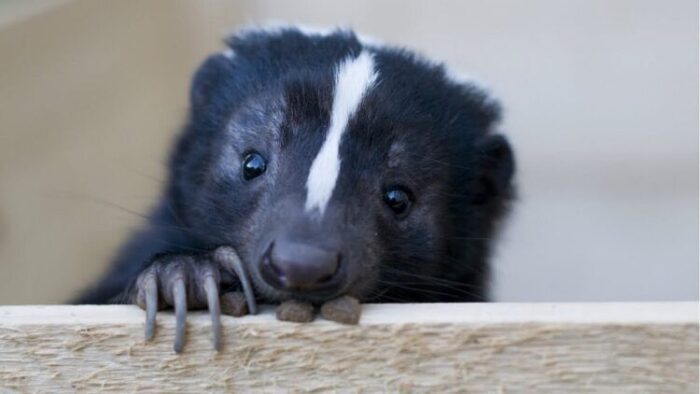Curiosity often leads us to consider unconventional pets, and skunks often come to mind. Can these notorious creatures make good companions? And if so, how do you properly care for them? In this guide, we’ll delve into the intriguing world of keeping skunks as pets, exploring the ins and outs of their care to help you make an informed decision and ensure a happy, healthy life for both you and your unique new friend.
However, I would advise not to own a pet skunk for the following reasons:
They have a curious and active temperament. They literarily get into and on everything. Not to mention their nasty spray (de-scenting gets rid of this).
Food and Safety: Skunks have a high risk of obesity and because only few people keep them as pets, creating a formulated feed for them becomes hard since little is known about them.
Health: Unlike dogs and cats, it is hard to see a vet who specializes in the care and treatment of skunks. The veterinarian also might not be very knowledgeable about skunks, because not a lot of people have skunks.
Skunks shed their coats once or twice a year. The breeding season for skunks begins in late February. Gestation lasts 7 to 10 weeks. The babies are born in early May. There is usually only one litter per year. Litters are usually 4 to 6 kits but maybe between 2 to 16.
ALSO SEE: Can Skunks Climb or Jump Fences?
Table of Contents
How to Care for Pet Skunks
A baby skunk can be des-scented between the ages of 3-4 months of age, and females at 4-6 months of age, so there is will be no concern of them letting loose their musky spray.
See also Do Skunk Dens Smell? How Bad? LEARN MORE!
Similar to tail docking, debarking, ear pinning, and de-clawing, the process is quite humane and a simple one at that!
A skunk diet typically consists of veggies, fruit and animal protein, including insects, poultry and fish. Some skunk food like Skunkie Delight adds ground turkey to their mix, though it’s crucial to limit these additives to avoid health issues such as obesity.
To reduce feeding costs, you can breed and feed mealworms.
Yes, wild skunks are most active at dawn and dusk, but pet skunks can be trained to have a sleep cycle that mirrors that of their human counterparts.
They are playful in nature and enjoy cuddling. So, you can’t get bored with them around. They do have a tendency to get into things though, so keep that in mind.
Common Name: Skunk
Scientific Name: Mephitis mephitis
Adult Size: 20 to 31 inches long, weighing up to 15 pounds
Life Expectancy: 10 to 15 years in captivity
Can You Have a Pet Skunk at Home?
Being curious diggers means your pet skunk might scratch up your home with its teeth and claws if it’s not skunk-proofed.
It is best to have a special play area for your skunk when unsupervised. This play area can be filled with blankets and toys that engage their cuddly, playful, and curious nature.
Also, never let them out by themselves because skunks, like ferrets, lack homing instincts and get lost easily. de-scented skunks are also missing their primary defence mechanism: spraying.
Skunks can be potty trained to use a litter box, like cats. Simply place the litter pan in a corner that they like to go to the bathroom in. If the skunk misses the corner, try putting small amounts of vinegar on their accident spots so they associate that with something that smells bad.
See also What’s A Good Way To Describe A Broken Skunk? [Reply]
Domestic pet skunks have a lifespan of up to 10 years while wild skunks live up to three years.
Pet Skunks Legal States
- Wyoming
- Wisconsin
- West Virginia
- South Dakota
- Pennsylvania
- Oregon
- Oklahoma
- Ohio
- New Mexico
- New Jersey
- New Hampshire
- Michigan
- Massachusetts
- Iowa
- Indiana
- Florida
- Alabama
When considering a pet skunk as your new family member, make sure to check legality in your area. Check out a list of exotic animal laws in your state.
States like Kentucky, Michigan, Oregon and Pennsylvania allow skunks to be kept as pets as long as you have a permit and vaccinations. In some states, like Florida, Indiana, Ohio, New Jersey and Wyoming,
it is completely legal to keep the skunk if it was bred in the state. Before thinking about getting a pet skunk, check state laws and make sure they are legal to own in your area.

Can Pet Skunks Spray?
Any skunk (including pet skunks) can spray unless their spray glands are removed earlier on.
Can You Potty Train a Skunk?
A skunk can be potty trained to use a litter box, like cats. Simply place the litter box where the skunk tends to relieve himself.
The skunk will continue using that space, only now it will be getting used to the litterbox as well.
Are Wild Skunks Good Pets?
Of course not! Wild skunks have grown already, and cannot enjoy socializing with humans. It will not be comfortable around people and will be unable to thrive in a domestic household.
Pet skunks are usually bred and raised by humans. They bond easily with people at a very young age and can get along well in domestic situations.
They are also used to living in homes and therefore, do a great job of adapting.
Do Pet Skunks Need Exercise?
Yes, they do. Skunks are active animals that enjoy moving from one place to another. So, do not house them in a cage for long periods of time unless they become destructive and hostile.
Can Skunks Swim?
Yes, skunks (both pet and wild) can swim but naturally prefer drylands to water.
See also Can Skunks Climb – Most Asked Questions ANSWERED!
Can Skunks Get Rabies?
Yes, skunks or any other warm-blooded mammal can carry rabies.
Can Dogs Get Rabies From Skunks?
Yes, a wild skunk with rabies can transfer it through its saliva if it bites a dog.
Can Baby Skunks Get Rabies?
An unvaccinated baby skunk can get rabies
Can Cats Get Rabies From Skunks?
Yes, a wild skunk with rabies can transfer it through its saliva if it bites a cat.
Do Most Skunks Have Rabies?
Yes, they do.
Can Skunks Eat Cat Food?
Yes, they can but dog and cat food can cause obesity in skunks. So, I would avoid feeding them that.
Can Skunks And Cats Breed?
Cats and skunks cannot interbreed in any natural way. Despite the nickname “polecat” applied to skunks, they are absolutely not in the same family.
Skunks:
Kingdom: Animalia, Phylum: Chordata
Class: Mammalia, Order: Carnivora
Superfamily: Musteloidea Family: Mephitidae
Cats:
Kingdom: Animalia, Phylum: Chordata
Class: Mammalia, Order: Carnivora
Suborder: Feliformia, Family: Felidae
Can Skunks And Cats Be Friends?
Yes, they can. However, a fight will break out if a cat tries to run a skunk out of the mammal’s territory.
Can Skunks Attack Humans?
When it comes to face to face with a human, a skunk will choose to flee but might attack when cornered.
Can Skunks And Raccoons Live Together?
Normally, No! but a common goal might bring them together, temporarily. No. A raccoon isn’t interested in a skunk, nor is a skunk interested in a raccoon.
Can Skunks And Possums Live Together?
No. A possum isn’t interested in a skunk, nor is a skunk interested in a possum.
Can Skunks And Squirrels Mate?
It is physically impossible for a skunk and squirrel to mate. Squirrels (Sciuridae) and skunks (Mephitidae) are of two different mammal families and, as such, are too genetically dissimilar to breed.
Can Skunks Be All Black?
Although rare, it is possible to see an all-black skunk
Can Skunks Be All White?
Although rare, it is possible to see an all-white skunk

With over 5+ years of experience in pest control and a PhD in Entomology, our author brings a blend of scientific knowledge and practical expertise to Pestifier.com. Passionate about creating pest-free environments, they provide effective tips and strategies for managing and preventing pest infestations. Connect on Facebook for the latest updates and insights.

